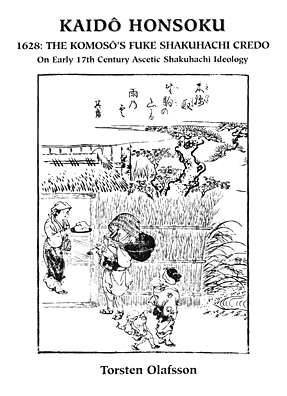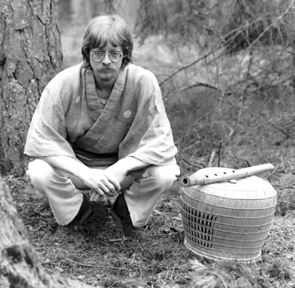
![]()
Torsten Olafsson
KAIDÔ HONSOKU
1628: THE KOMOSÔ'S FUKE SHAKUHACHI CREDO
On Early 17th Century Ascetic Shakuhachi Ideology
|
|
|
Who were the Komosô,
or "Mat Monks", of Medieval Japan?
How were the Komosô related to the Komusô of the Fuke
Sect of Shakuhachi?
While translating and interpreting the Kaidô Honsoku (the document was composed in classical Japanese), Olafsson realized that among the numerous known written sources of Fuke Shakuhachi history and ideology, the Kaidô Honsoku should be considered as the most important of them all.
The Komosô were definitely the immediate forerunners of the Komusô of the Fuke Sect. They did not, however, explain their peculiar practice in terms of Zen philosophy. Ideas derived from Indian Advaita Vedanta philosophy, Chinese Yin-Yang cosmology, Five Element theory, Taoism and Ch'an Buddhism, combined with Japanese Shingon, Tendai, Pure Land thought and Shintô were all very influential. The legend that Kakushin (Hottô Kokushi) introduced ancient Fuke shakuhachi pieces from China in the mid-13th century is a myth which was invented as late as the 1640s, along with the new denomination "ko-mu-sô" or "empty-nothing-monk". Furthermore, typical Zen concepts like "zazen", "sammai" and "takuhatsu angya" do not figure in the Kaidô Honsoku at all. While acknowledging the existence of "16 Komosô branch sects", the Kaidô Honsoku contains no reference to any actual Fuke Shakuhachi temple organization whatsoever.
As a whole, Torsten Olafsson's thesis presents not only a full and comprehensively annotated translation of the Kaidô Honsoku text itself, but also many references to other significant early sources of Fuke Shakuhachi history, including the following:
o New translations from Chinese
and Japanese literature
o Rare pictures and detailed maps
o Discussions and theories which have not been disclosed to the
public before
o A substantial bibliography and reprints of all the classical
Japanese literary sources quoted in the thesis.
Included with this edition is a a CD-ROM featuring Torsten Olafsson's complete 147-page M.A. thesis in PDF-format and one of the tracks, "San-ya no Kyoku", from Torsten's Myôan Shakuhachi solo album Standing Waves Zen Shakuhachi Meditations (Fønix Musik CD, 2001).
Published by Tai Hei Shakuhachi ISBN: 0-9722878-8-4
24 pages. BK-12
 |
Torsten Olafsson - musician, composer, musicologist, writer, editor, graphics designer, and Japanologist - entered the path of music when taking up the piano, the recorder and dancing in his early childhood. While exploring new instruments such as the acoustic guitar, vibraphone, Indian tabla and percussion, Torsten also studied Chinese Culture and Eastasian music at the University of Copenhagen since 1968. Becoming deeply fascinated with Eastern music forms and philosophies, he decided to learn the shakuhachi and the extraordinary Zen Buddhist tradition of that instrument commonly known as 'Fuke Shakuhachi'. After three years of intensive Japanology studies, Torsten finally made his way to Japan. Enrolling as a special research student in Japanese Arts & Aesthetics at Kyôto University (1977-78), he was also accepted as a Fuke Shakuhachi student at the Kyôto Zen temple, Myôan-ji. There, under the guidance of Ozawa Seizan, Torsten was initiated into the secrets of the particularly ascetic, Buddhist shakuhachi tradition known as 'Myôan Shakuhachi'. While doing research in Tokyo in 1986, Torsten also studied the shakuhachi with Yokoyama Katsuya. His solo album "Standing Waves - Zen Shakuhachi Meditations", recorded in 1983, was successfully re-released on CD by Fønix Musik, Denmark, in November 2001. Along with several decades of contemporary music research and music publishing activities, Torsten Olafsson has undertaken thorough academic studies in the history and ideology of the Japanese shakuhachi. Torsten has written a number of essays and radio lectures on the subject of Far Eastern music, philosophy and art, and performed as a shakuhachi soloist. |
| Learn more about Torsten Olafsson The Zen Shakuhachi Truth Research Web Pages Recordings |
| Price of Book | Ordering Information |